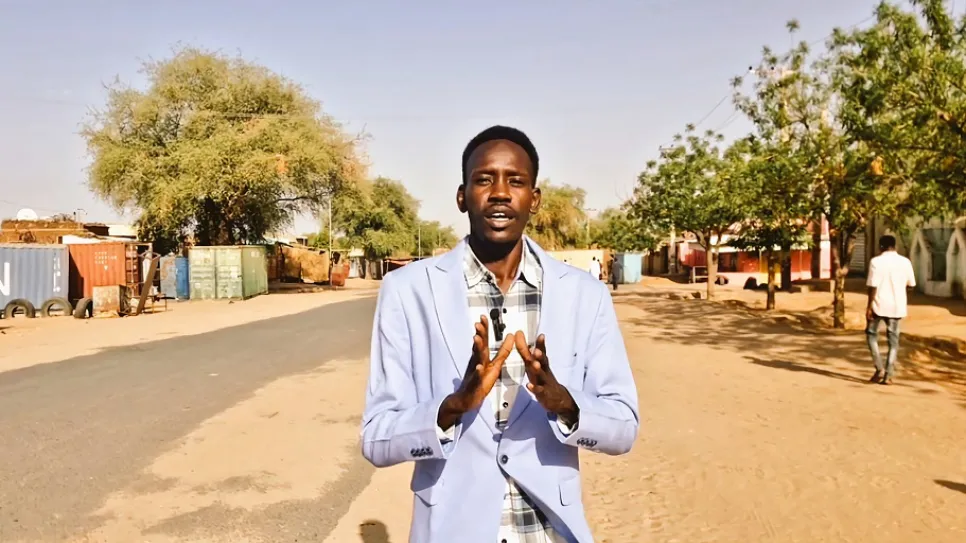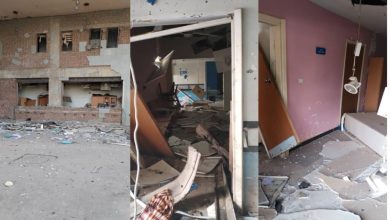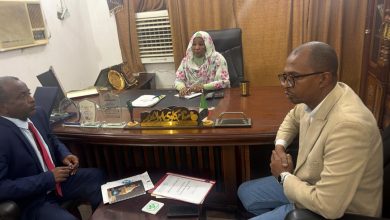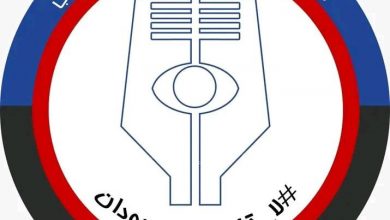Chased, Raped, and Starved: Sudanese Journalists Under Siege in El Fasher
Report – Committee to Protect Journalists (CPJ) Team

In Sudan’s western Darfur region, journalists in El Fasher are trapped under siege, enduring violence, hunger, and relentless shelling alongside the very people whose lives they are documenting.
The Rapid Support Forces (RSF), a paramilitary group that evolved from the notorious Janjaweed militias accused of atrocities during past Darfur conflicts, have been battling the Sudanese army for control of the country since April 2023. In May 2024, they encircled the city in a bid to capture the last major urban center in Darfur still held by the government.
Satellite images from Yale University’s School of Public Health show that RSF fighters built earthen barriers around nearly the entire city. No international aid has reached El Fasher for over 16 months, as the RSF blocked or attacked convoys carrying large-scale humanitarian supplies. In late September 2025, the Sudanese Armed Forces carried out an airdrop operation, delivering very limited amounts of food and medicine to army-held areas of El Fasher for the first time in five months.
Seven journalists interviewed by CPJ—all currently or recently residing in the city—described their isolation from food and aid under continuous bombardment. Some also reported sexual violence and arbitrary detention at the hands of RSF fighters because of their reporting.
One journalist told CPJ, on condition of anonymity for fear of reprisal:
> “We are starving, we are hunted, but we continue to cover the events. Our voices are the only thing left.”
After the RSF lost control of the capital Khartoum in March, El Fasher became the epicenter of violence. The group seeks to seize the city to cement its grip over Darfur, where it has already been accused of committing acts of genocide.
The impact of shelling on El Fasher
Journalists told CPJ that RSF fighters often raid neighborhoods, storm homes, and use informants inside the city to identify them.
One woman recounted that RSF fighters stormed her neighborhood in September. When they discovered she was a journalist, they forced her family out of the house, then three gunmen beat and gang-raped her.
“This was not random violence—it was punishment for my work,” she told CPJ, speaking anonymously out of fear of reprisal.
The Darfur Women Journalists’ Forum told CPJ it had documented the rape of six women journalists since the start of the war, four of them in El Fasher. The actual number is likely much higher, given the stigma around sexual violence and the lack of support available to survivors.
“I had no access to emergency contraception, no antibiotics, no pain relief,” said the journalist, explaining that the destruction of hospitals and clinics left Sudanese civilians without emergency medical care.
“I was lucky to escape El Fasher. But where I am now, none of these services are available either. I still don’t know if I am pregnant, and there isn’t a single doctor to check me,” she said. “The psychological toll is unbearable—I carry it every day.”
Life under siege in El Fasher
Another journalist told CPJ she was detained by RSF forces for 45 days in April and May 2025 because of her reporting on the siege.
“I was beaten, tortured, and threatened. They wanted me to stop my journalism. Some acquaintances informed on me to Reporters Without Borders. Informants are everywhere, handing journalists over for protection or money,” she said.
“I eventually took a break from journalism, but ironically, not because of their intimidation—rather because I broke down from hunger,” she added.
Journalist Hamed Haroun said RSF fighters stopped him on his way home. They searched his phone and found his reporting on the RSF shelling of El Fasher’s last remaining hospital.
“They arrested me when they discovered I was a journalist. They accused me of collaborating with the army. I was beaten, tortured, and interrogated for 24 hours,” he said.
Two other journalists told CPJ that Reporters Without Borders published their names and photos online, sometimes alongside death threats.
Lana Awad Hassan, who fled El Fasher six months ago after being shot in the leg by RSF fighters, told CPJ:
“Everyone is afraid to work. Even if you write a good report, you don’t publish it under your name. Both the RSF and the Sudanese army target journalists—but that doesn’t stop us!”
Hunger as a weapon of war
Starvation is being used as a weapon of war in El Fasher, much like in Gaza, CPJ found, documenting journalists who are starving under siege conditions.
Since April 2023, more than 600,000 people have fled the city and surrounding camps, while those who remain face famine, according to the UN. Half of Sudan’s population—25 million people—are food insecure, in what the UN warns may become the largest hunger crisis in modern history.
Markets and shops are empty, forcing those trapped inside the city to resort to humiliating survival strategies, such as eating livestock feed.
“We live on ambaz (animal feed), which we grind to make porridge and stews. It’s meant for animals,” journalist Jihad Ahmed al-Badawi told CPJ, referring to a peanut-based paste often contaminated with fungi. “Families share a few spoonfuls of porridge, but they remain hungry.”
Journalists said they have suffered acute diarrhea, malnutrition, and poisoning from eating ambaz. Al-Badawi recalled how an entire family died after consuming contaminated feed.
“People are literally dying from what they are forced to eat,” he said.
Journalist Muammar Ibrahim said he hasn’t seen fruit in El Fasher in more than a year.
“Some families escape the siege by walking over 60 kilometers through the desert, mostly at night to avoid fighters, to reach villages in search of millet and sorghum,” he told CPJ.
Prices of what little food remains are astronomical: a kilogram of sugar, which cost £6 Sudanese pounds in early 2023 (around US$2 at the time), now costs £100,000 ($28 at current black-market exchange rates), according to journalists. Flour, rice, and powdered milk can reach £280,000 ($80) per kilogram.
“Hunger is infidel,” said one journalist, using a common Arabic expression meaning hunger strips people of patience, faith, and dignity.
Describing her collapse from anemia, one woman journalist said: “Sometimes you stop working, not because you want to, but because you simply cannot. I became too weak to walk.”
The lack of sanitary pads compounds the humiliation women journalists face.
“We use pieces of hijab cloth to deal with our periods. It’s degrading, and you can’t stand in the street to report such things,” she said.
Choosing to report, despite the risks
Despite the dangers, journalists in El Fasher have pledged to continue their reporting, even though electricity and internet access in the city are nearly gone.
“We can no longer cover the war in real time. We write, and when things calm down, we publish—but news doesn’t reach us on time. This is a tactic to silence us and cut El Fasher off from the news,” Hassan told CPJ.
Their message to the world is clear:
“I chose to stay in El Fasher to be the voice of my people, who have no voice now. Journalism here is not just a job—it is a duty, even if it costs us our lives,” Ibrahim told CPJ.
“This is not just a war between the army and the RSF. It is a war on truth. If the world remains silent on Sudan, it will be complicit in burying El Fasher and its people.”
CPJ contacted Reporters Without Borders via its website for comment but received no reply.




